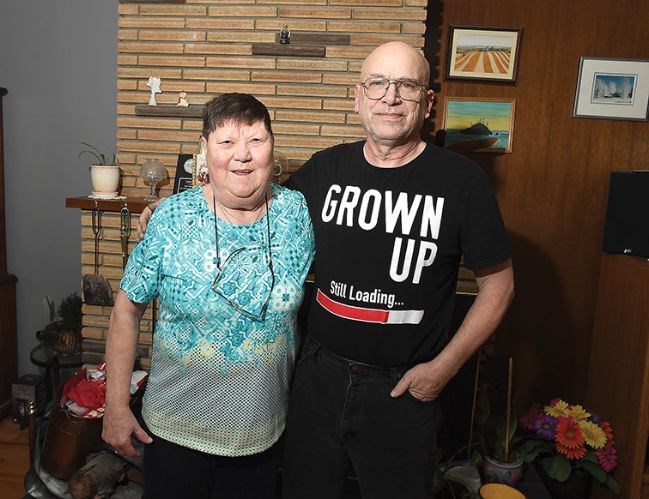Julia (Bussey) Cook worked as the coordinator for the Prince George Stroke Recovery Branch, a part of the not-for profit Stroke Recovery Association of B.C., for 10 years until she had a stroke in 2015.
When she suffered the stroke, she was also involved in a motor vehicle accident. Four years later, she is still slowly recovering from one of the most traumatic events in her life.
Julia explained, "A stroke happens when blood cannot supply oxygen and important nutrients to your brain cells. When brain cells do not get enough oxygen or nutrients, they die. A stroke can happen in two main ways: cholesterol plaque or a blood clot blocks an artery or a blood vessel leaks or breaks. There is also a transient ischemic attack (TIA) which happens when the blood supply to the brain is blocked temporarily.
"A stroke can happen to anyone and the main thing to remember is that the faster the stroke is treated the better it will be for the patient.
"Fortunately, my previous work with the Stroke Recovery Association has helped me understand my situation. The association provides services and information to anyone whose life has been affected by stroke and offers social, emotional, mental and physical support for stroke survivors, their caregivers and their families. Program activities include exercise sessions, physical games designed to maintain coordination and mental fitness, speech therapies, health and wellness lectures, caregiver support and community reintegration."
Julia, the eldest of five children, was born in Moose Jaw, Sask. in 1944. In 1966, she completed her licensed practical nursing degree (LPN) and worked her way across Canada, landing in New Brunswick where she took her civil service exam allowing her to work for the Department of Veterans Affairs.
Her sister had previously moved to Prince George; Julia and her husband Bob Crozier followed in 1974. Bob was a carpenter and easily found work with Erickson Construction upon their arrival in Prince George. Bob passed away in 1984 due to a heart attack.
Julia worked for the Woolco department store for four years. She worked as a care aid and the recreation director at the Simon Fraser Lodge for 26 years. She was laid off in 2004 when the job was changed to contract work. From there, she went to work for the We Care Home Health Services (which later became Northern Home Care) for the next eight years and coordinated blood pressure, flu and wellness clinics.
Julia met Neal Cook at a dance in 1989. They got married in 1991 and as she said, "The rest is history."
Neal was born in Vancouver; his parents Edward and Martha Cook moved to Prince George in 1969 where his father worked as a mechanic at Lakeland Mills.
Neal graduated from Duchess Park school and remembers him and his two brothers crossing the railway tracks twice a day on their way to and from school.
After graduation, Neal and a partner formed an auto body business for about six years. He went to work at Prince George Precut, attended CNC and earned his accounting diploma and drove for a towing company. Later, he worked in Quesnel for Frank Thompson Trucking out of Prince George and then he drove for Mel Wiebe hauling freight for the next five years. Neal is now semi-retired, works part=time hauling freight and enjoys working in his woodworking shop and playing bridge.
Over the years, Neal was a volunteer driver for the CNIB curling team and volunteered at the Legion.
Julia was a volunteer at the Hospital Auxiliary for 20 years, the Prince George Council of Seniors for five years and the Festival of Trees for 20 years.
Julia concluded by saying, "My life was so much easier before my stroke. I still have memory deficiencies and I am working toward improvements to my mobility.
"I have recovered enough to currently act as the interim coordinator of our Stroke Recovery Branch. Our program offers social events, exercise, communication, cognitive stimulation and friendship.
"I have chosen to not drive until I am better; with that decision I have to depend on the HandyDART BC Transit system, friends, relatives and my husband Neal for transportation.
"I realize that caring for stroke survivors can cause high levels of emotional, mental, and physical stress for both the stroke survivor and the caregiver. Caregiving is challenging and is often described as the most difficult job you never applied for.
"I would like to take this opportunity to thank my doctors and the HandyDART transit system, friends, relatives and my loving husband Neal for all that they do to help me get through this.
"To the general public my hope is for compassion and empathy to all people with disabilities."



